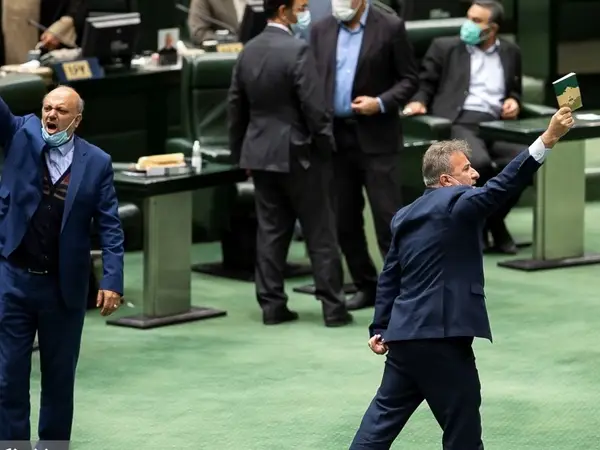Nepotism has become such a characteristic feature of the Raisi government that even Iran's hardline parliament is protesting appointments based on kinship.
One of the latest cases of nepotism in the Raisi administration is the nomination of Massoud Fayazi, a close relative of Tehran's mayor Alireza Zakani as education minister.
Iran International TV's correspondent Mojtaba Pourmohsen has revealed Fayazi's debatable academic credentials in an investigative report which he summarized in a tweet on November 10. These include a Ph.D. degree awarded by a committee that is not linked to any official academic institution. Even his earlier diploma in the area of civil engineering is also reportedly not quite sound.
According to the Iranian Labor News Agency (ILNA) several lawmakers expressed their opposition to Fayazi's nomination when Majles Speaker Mohammad Bagher Ghalibaf announced it on Tuesday.
The Majles has already rejected Raisi's first choice for Minister of Education Hossein Baghgoli, a relative of the President's wife, in August. Members of the Cultural Committee of the Majles told reporters on Wednesday that they will try to make sure Fayazi also does not win the parliament's vote of confidence.
Earlier, Raisi's brother-in-law Ali Alamolhoda who was appointed as the chancellor of Payam Noor University resigned his post and Zakani was forced to fire his son-in-law under pressure from the press and social media a few days after he was appointed as his own deputy.
Nepotism was also a problem that led to scandals for Hassan Rouhani and Mahmoud Ahmadinejad's administrations, but the problem appears to be even more widespread under President Ebrahim Raisi.
During the past weeks, several media reports accused Health Minister Bahram Einollahi, Economy Minister Ehsan Khandouzi and Oil Minister Javad Owji of giving key posts to their own or other officials' relatives in their agencies. Raisi, pressed on several occasions including during his meeting last week with reformist journalists, was forced to say that he would look into the matter. But subsequently he ordered his cabinet ministers to refute reports about appointing their relatives if such reports are not true.
Mohammad Saleh Jokar, an MP for Yazd told Khabar Onlinethat nepotism will lead to corruption and that he did not expect such things to happen in President Raisi's government. Meanwhile, according to the news agency of the Iranian parliament, Jalil Rahimi Jahanabadi, a conservative lawmaker close to Raisi, told reporters that appointing Fayazi as the Minister of education and ignoring capable individuals as candidates for the post would be an insult to Iranian teachers and cultural figures.
Another hardline lawmaker, Esmail Kowsari, criticized President Raisifor his failure to give key posts to well-qualified individuals and acknowledged that appointments based on kinship with top officials will inevitably lead to corruption.
Reformist figure Zahra Nejadbaharam also said that "appointing officials' in-laws to key posts is a disgrace for the Raisi administration and Raisi needs to intervene in the matter. This is an undesirable practice that damages the country's prestige."
According to Khabar Online, vice president for parliamentary affairs Mohammad Hosseini called on state officials to revoke nepotism-based appointments as the government's critics are likely to use them against the Raisi administration.
This latest bout of attacks on the new president adds to criticism about Raisi’s appointments in general. Many top officials are not qualified for their posts and after one hundred days, the government has done little to improve the economy and other crises gripping the country.
